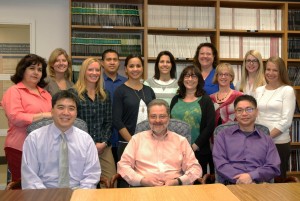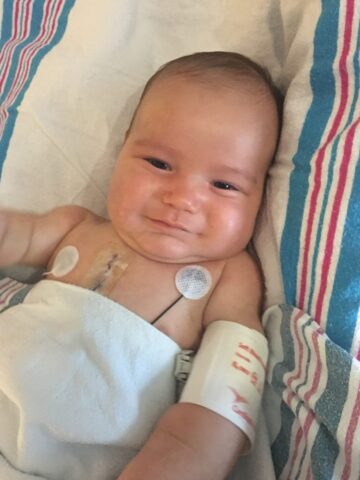It should come as no surprise that Dr. Jose Abdenur’s favorite fictional M.D. is Gregory House, television’s sleuthing physician known for deducing elusive diagnoses.
After all, Dr. Abdenur serves as chief of CHOC Metabolic Disorders Division, which specializes in diagnosing rare conditions that require hours of unraveling symptoms, researching cases and analyzing data to give parents long-sought answers to what’s ailing their child.
“What we do often begins a life-long treatment,” says Dr. Abdenur. “These conditions create a bond with the family and our staff.”
Dr. Abdenur leads a group of about 20, including himself and two other physicians: Dr. Richard Chang and Dr. Raymond Wang Comprised of a clinical team and laboratory team, CHOC’s metabolic disorders division is large compared to other similar divisions at other hospitals, and remains in high clinical demand, the physicians say.
The division’s most commonly treated conditions are glycogen storage diseases, mitochondrial disorders, urea cycle defects, fatty acids oxidation defects and organic acidemias. CHOC Metabolics is also the largest referral center in California for metabolic diseases detected by newborn screening.
And the division continues to expand: In mid-January, the division opened a new laboratory focusing on energy metabolism. There, researchers will study patients who have defects in energy production, underscoring the division’s commitment to broadening its understanding of metabolic disorder subsections.
A team- and family-centered approach
A core principle for the division is teamwork. No matter their position, each member of the division plays a vital role in diagnosing and caring for children with rare, often lifelong conditions, Dr. Abdenur says.
“We can’t do what we do without dieticians, genetic counselors and case managers for every single case,” he says. “We need everyone.”
Weekly, the team sees about 45 patients on an outpatient basis, operating several clinics, including the multidisciplinary lysosomal and neurometabolic clinics. The division treats between five and 10 patients a week on an in-patient basis.
Persistence is a chief value for the division. Tenacity is essential because the path to diagnosing a metabolic disorder can be a long and hard, and sometimes a dead end, says Dr. Abdenur.
“I never tell a family that for sure I’ll find out what’s wrong, but for sure, we will look as hard as we can,” he says.
Metabolic disorders physicians are sometimes charged with telling parents nothing more can be done for their child’s condition. And though not ideal, that news can bring solace to a parent, Dr. Abdenur says.
“Even when they know there is nothing more to do, there is a relief,” he says. “That way, they’re not still always wondering if they’re missing something.”
Recognizing that, the division places a keen focus providing family-centered care: Close parental involvement is key during diagnosis and treatment, which often lasts a lifetime. The division also hosts regular family events to provide education and activities for patients and families, as well as nutritionally appropriate treats and recipes.
A focus on research and education
While patient care is the top priority for the division, research and education also remains a central focus for the division.
CHOC metabolics partners with UCLA, Cedars Sinai and Harbor UCLA in a post-graduate program that offers genetics research training opportunities and is supported in part by a grant from the National Institutes of Health. Dr. Abdenur serves as its program director for medical biochemical training programs, and training director for clinical biochemical genetics.
The division also has a relatively new fellowship program. The program is designed to help train future metabolic disorders specialists, says Dr. Chang, noting that in the last round of metabolics certifications, fewer than 20 specialists earned the distinction nationally.
“Metabolics is a specialty that not all children’s hospitals have, and we’re trying to help improve access by training people in the field,” says Dr. Chang. “We’re trying to compensate for the shortage of metabolics physicians.”
The division is also working to broaden metabolics knowledge for CHOC nurses. An upcoming one-day conference made possible by the donation of a family of a metabolics patient will offer nurses more information about various metabolics disorders, as well as insight into the plights of patients and their families.
This is one in an occasional series introducing CHOC specialists. Learn more about how to refer patients to CHOC.
Refer a patient to metabolic disorders at CHOC
CHOC specializes in the diagnosis and treatment of inborn errors of metabolism.





